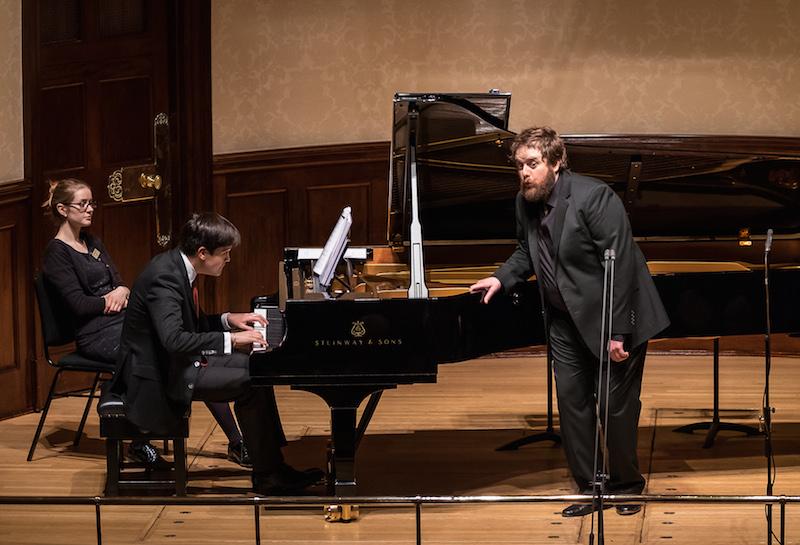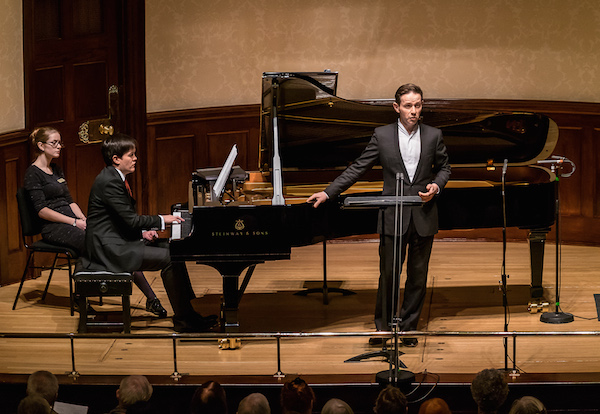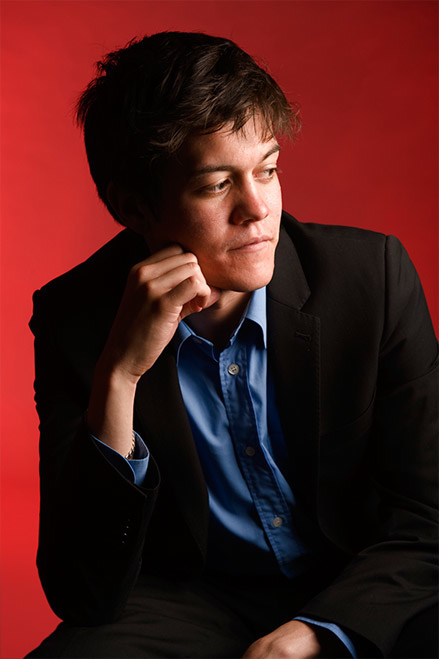Davies, Clayton, Baillieu, Wigmore Hall | reviews, news & interviews
Davies, Clayton, Baillieu, Wigmore Hall
Davies, Clayton, Baillieu, Wigmore Hall
A scintillating recital combines old and new music to fascinating effect

Last night’s Wigmore Hall recital by countertenor Iestyn Davies and tenor Allan Clayton, accompanied by James Baillieu, was an all-round triumph: brilliantly programmed, superbly sung and very thought-provoking. Mixing solo items with duos, the programme encompassed Purcell, Britten, Adès, Barber and the young American composer Nico Muhly. If it had been a competition – which it wasn’t – Britten would have been the champion.
Britten’s Canticle II of 1952 sets the story of Abraham and Isaac, as told in the medieval mystery plays. The two singers represent Abraham (tenor) and his young son Isaac (countertenor) and sing together as the voice of God. In one of many theatrical moments through the evening, the two opened the piece as God by turning their backs on the audience, and singing resonantly into the open piano lid.
 Clayton and Davies (pictured above) characterised their two parts artfully, Abraham weighed down by God’s instruction to kill his son, and Isaac fearful but compliant. Britten, fresh from the success of Albert Herring, moves fluidly between quickfire recitative and aching arioso, such as Isaac’s “Father, do with me as you will”. The ending, after a brutal passage in which James Baillieu threw all delicacy aside and attacked the piano ferociously, is meltingly beautiful. We are enjoined to follow the example of Abraham, who in his obedience leads us to God.
Clayton and Davies (pictured above) characterised their two parts artfully, Abraham weighed down by God’s instruction to kill his son, and Isaac fearful but compliant. Britten, fresh from the success of Albert Herring, moves fluidly between quickfire recitative and aching arioso, such as Isaac’s “Father, do with me as you will”. The ending, after a brutal passage in which James Baillieu threw all delicacy aside and attacked the piano ferociously, is meltingly beautiful. We are enjoined to follow the example of Abraham, who in his obedience leads us to God.
And this is the troubling point. The story of Abraham and Isaac is one of infanticide averted only at the last minute by a capricious and cruel God. Abraham is a man who will do God’s bidding, even when that bidding is plainly evil and wrong – and we are instructed to treat him as a model of moral behaviour. Britten casts this story in such beguiling and brilliantly crafted music as to gloss over the wickedness of the story, making us, the audience, complicit. The performance was brilliant, and the piece stood out as the best of the evening – but I was left feeling ambivalent about what it meant.
Nico Muhly (b.1981) composed his Lorne ys my liking as a companion piece for Britten’s Canticle II, using the same forces and also mining the mystery plays for his text, which in Muhly’s case tells of the reactions of three women and two angels to discovering Christ’s empty tomb. Although full of fine writing the piece did not hold together with the same fluency as the Britten, although this is a high benchmark. The scoring for voices was the most interesting point, with Clayton and Davies often singing in close proximity. They matched their sound beautifully, especially in the a cappella penultimate stanza.
This piece ended with another theatrical flourish, Davies and Clayton both joining Baillieu at the piano for a six-handed coda. It came a bit unstuck in a couple of moments, and was perhaps asking a bit much of the singers.
 Of the other items, perhaps the biggest revelation was Samuel Barber’s Three Songs Op.10, setting James Joyce. Allan Clayton really brought these to life and in the third song was given free rein to let rip, filling the hall with a big sound. This was one end of his wide dynamic range, which was elsewhere hushed, but always clearly pronounced. James Baillieu (pictured left by Kaupo Kikkas) showed himself here – and indeed throughout – a skilled accompanist, following sensitively and taking the lead where it was demanded.
Of the other items, perhaps the biggest revelation was Samuel Barber’s Three Songs Op.10, setting James Joyce. Allan Clayton really brought these to life and in the third song was given free rein to let rip, filling the hall with a big sound. This was one end of his wide dynamic range, which was elsewhere hushed, but always clearly pronounced. James Baillieu (pictured left by Kaupo Kikkas) showed himself here – and indeed throughout – a skilled accompanist, following sensitively and taking the lead where it was demanded.
Thomas Adès’s The Lover in Winter was written when he was 18, and is an extraordinarily assured piece, chilly and remote until the final song, where the physical passion becomes a descending chromatic line full of longing. Iestyn Davies sang virtually without vibrato, helping to conjure Adès’s imagined medieval world, but also largely without consonants, losing some of the bite of the Latin words.
The programme started and ended with realisations – by Britten, Tippett and Adès – of songs and duets by Henry Purcell, such an influence on all subsequent British composers. In “Music for a while” Davies started with a first note which came from nowhere and bloomed into something wonderful; Baillieu’s piano playing was restrained, bringing out the inner parts of the accompaniment. Adès’s setting of “Full fathom five” was by comparison less deferential, starting with bold octaves on the piano. After finishing appropriately with everyone on stage for “Sound the trumpets” we were treated to a hilarious encore in which the singers swapped roles, Clayton singing falsetto and Davies in full voice, for the children’s song “The Deaf Woman’s Courtship”.
Although all the performers are young – in classical music terms – it would be inappropriate to talk about their “potential” to become great. All of them, but Allan Clayton in particular, are already spectacularly good, and, never mind the future, are doing amazing things in the here and now.
rating
Explore topics
Share this article
The future of Arts Journalism
You can stop theartsdesk.com closing!
We urgently need financing to survive. Our fundraising drive has thus far raised £49,000 but we need to reach £100,000 or we will be forced to close. Please contribute here: https://gofund.me/c3f6033d
And if you can forward this information to anyone who might assist, we’d be grateful.

Subscribe to theartsdesk.com
Thank you for continuing to read our work on theartsdesk.com. For unlimited access to every article in its entirety, including our archive of more than 15,000 pieces, we're asking for £5 per month or £40 per year. We feel it's a very good deal, and hope you do too.
To take a subscription now simply click here.
And if you're looking for that extra gift for a friend or family member, why not treat them to a theartsdesk.com gift subscription?
more Classical music
 Bizet in 150th anniversary year: rich and rare French offerings from Palazzetto Bru Zane
Specialists in French romantic music unveil a treasure trove both live and on disc
Bizet in 150th anniversary year: rich and rare French offerings from Palazzetto Bru Zane
Specialists in French romantic music unveil a treasure trove both live and on disc
 Scottish Chamber Orchestra, Ibragimova, Queen’s Hall, Edinburgh review - rarities, novelties and drumrolls
A pity the SCO didn't pick a better showcase for a shining guest artist
Scottish Chamber Orchestra, Ibragimova, Queen’s Hall, Edinburgh review - rarities, novelties and drumrolls
A pity the SCO didn't pick a better showcase for a shining guest artist
 Kilsby, Parkes, Sinfonia of London, Wilson, Barbican review - string things zing and sing in expert hands
British masterpieces for strings plus other-worldly tenor and horn - and a muscular rarity
Kilsby, Parkes, Sinfonia of London, Wilson, Barbican review - string things zing and sing in expert hands
British masterpieces for strings plus other-worldly tenor and horn - and a muscular rarity
 From Historical to Hip-Hop, Classically Black Music Festival, Kings Place review - a cluster of impressive stars for the future
From quasi-Mozartian elegance to the gritty humour of a kitchen inspection
From Historical to Hip-Hop, Classically Black Music Festival, Kings Place review - a cluster of impressive stars for the future
From quasi-Mozartian elegance to the gritty humour of a kitchen inspection
 Shibe, LSO, Adès, Barbican review - gaudy and glorious new music alongside serene Sibelius
Adès’s passion makes persuasive case for the music he loves, both new and old
Shibe, LSO, Adès, Barbican review - gaudy and glorious new music alongside serene Sibelius
Adès’s passion makes persuasive case for the music he loves, both new and old
 Anja Mittermüller, Richard Fu, Wigmore Hall review - a glorious hall debut
The Austrian mezzo shines - at the age of 22
Anja Mittermüller, Richard Fu, Wigmore Hall review - a glorious hall debut
The Austrian mezzo shines - at the age of 22
 First Person: clarinettist Oliver Pashley on the new horizons of The Hermes Experiment's latest album
Compositions by members of this unusual quartet feature for the first time
First Person: clarinettist Oliver Pashley on the new horizons of The Hermes Experiment's latest album
Compositions by members of this unusual quartet feature for the first time
 Gesualdo Passione, Les Arts Florissants, Amala Dior Company, Barbican review - inspired collaboration excavates the music's humanity
At times it was like watching an anarchic religious procession
Gesualdo Passione, Les Arts Florissants, Amala Dior Company, Barbican review - inspired collaboration excavates the music's humanity
At times it was like watching an anarchic religious procession
 Classical CDs: Camels, concrete and cabaret
An influential American composer's 90th birthday box, plus British piano concertos and a father-and-son duo
Classical CDs: Camels, concrete and cabaret
An influential American composer's 90th birthday box, plus British piano concertos and a father-and-son duo
 Cockerham, Manchester Camerata, Sheen, Martin Harris Centre, Manchester review - re-enacting the dawn of modernism
Two UK premieres added to three miniatures from a seminal event of January 1914
Cockerham, Manchester Camerata, Sheen, Martin Harris Centre, Manchester review - re-enacting the dawn of modernism
Two UK premieres added to three miniatures from a seminal event of January 1914
 Kempf, Brno Philharmonic, Davies, Bridgewater Hall, Manchester review - European tradition meets American jazz
Bouncing Czechs enjoy their Gershwin and Brubeck alongside Janáček and Dvořák
Kempf, Brno Philharmonic, Davies, Bridgewater Hall, Manchester review - European tradition meets American jazz
Bouncing Czechs enjoy their Gershwin and Brubeck alongside Janáček and Dvořák
 Solomon, OAE, Butt, QEH review - daft Biblical whitewashing with great choruses
Even a top soprano and mezzo can’t make this Handel paean wholly convincing
Solomon, OAE, Butt, QEH review - daft Biblical whitewashing with great choruses
Even a top soprano and mezzo can’t make this Handel paean wholly convincing

Add comment